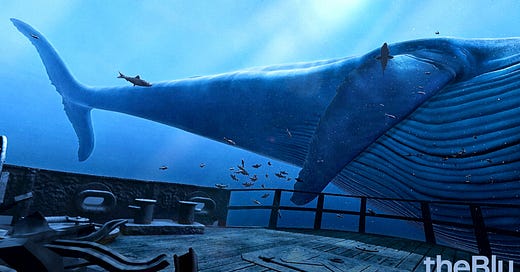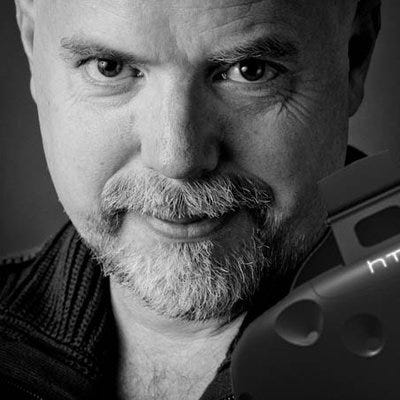Masters of Disruption: How the Gamer Generation Built the Future [25]
Doom co-creator Tom Hall on virtual reality and the future of game design.
This post is part of a longform project I’m serializing exclusively in my newsletter, Disruptor. It’s a follow-up to my first book, Masters of Doom: How Two Guys Built an Empire and Transformed Pop Culture, and it’s called Masters of Disruption: How the Gamer Generation Built the Future. You can find the table of contents, as it unfolds, here. To follow along, please subscribe to Disruptor and spread the word. Thanks!
In the coming weeks, I’ll be charting the evolution of virtual reality that grew from the gamer culture I chronicled in my book, Masters of Doom: How Two Guys Built an Empire and Transformed Pop Culture.
Today, I’m checking back in with one of the main characters from that story, veteran game designer Tom Hall, to talk about the present and future of VR gaming. (ICYMI, Hall and I discussed the metaverse in a previous post). As the co-founder of id Software, Hall helped pave the pixelated way for VR by co-creating the pioneering fast-action, first person shooters, Wolfenstein 3-D and Doom. He’s now senior creative director at Resolution, a company specializing in virtual reality and augmented reality games. This interview has been edited and condensed for clarity.
David Kushner: You’ve spent decades making games for PCs and mobile devices, what’s it like for you to design games for VR?
Tom Hall: It’s very different, and I like that. I think I've talked to Romero and Carmack about stuff like that. We all got a taste for loving the new thing, and capturing lightning in a bottle again. Because it was very fortuitous that we all came together and had the honor of coming up with a new genre of game. That was pretty weird to do. So being in VR now is exciting, because there's some language still left to be discovered, like player movement, or just what it means to be in that space, experiences you can have. It’s like a kid getting to play with new toys. It's very exciting to explore.
But the challenges are in the social space, where you're compartmentalizing small interactions over time. So you have to sort of think of games and structure them in a different way. And then in VR, you're the camera. Now a lot of the cheats that we use as game developers don't apply, because you can go anywhere you can go. So we have to either limit where you can go, or be honest about the things in the environment. Also, it changes the narrative point of view, because you have to really get their attention and make sure they don't miss something you're presenting to them or trying to teach them.
VR made a lot of things very simple and easy, but then you also have to keep focusing your design on interactivity and tactile interactions so that your experiences are substantive and fun and naturalistic. You have to do a lot less teaching. If you design it carefully, things that players do in VR are just like what they do in real life.
David Kushner: Why haven’t we seen a genre-defining VR game yet, like a Doom of VR?
Tom Hall: I think it will have to grow out of either something that's such a compelling experience that people just have to see it. It’s easy to get grandma to try it, and it’s just mind blowing. You put on TheBlu and you’re like, "Oh, look at the whale swim by!" That’s cool, but Grandma's not going to buy that and watch the whale go by forever.Pokémon GO was kind of like that. That got grandma and mom to walk around and get these cute little critters. They didn't really understand the context of it maybe, but it was something fun to do, and they could all do it. It was simple to understand, and it was already in their pocket. That’s the kind of convenience that needs to happen. And we're many years away from devices that aren't your phone that will create that same ease of use it.
Maybe we will outgrow phones and have some kind of wearable that we talk to like Star Trek's computer. But you don't always want your interactions to be public. There needs to be a private form of that as well that works. I think the metaverse is going to grow on many devices and you'll have many ways to interact with it. And regardless of how cool it is, VR will probably be a very, very small subset of that. AR [Augmented Reality] is interesting, because you could place real life content in your visual spectrum, Magic Leap type experiences, but much more evolved. You could have game content mapped into the real world, so you can play as you walk, like a perceived real world Pokémon GO kind of thing - as long as you don't create interactions that require sudden movement and cause you to strike strangers you didn't see.
David Kushner: What do you mean by “real world Pokémon GO kind of thing”?
Tom Hall: For instance, you can map real world spaces, there’s plenty of datasets out there. You can make game content appear contextually based on things that are in the real world. So if there's a stop sign, that could mean something in the real world. If there's a heart, that could be where certain things appear. You could go virtual fishing in any body of water that you see. So you can map game content to that. And business-wise, people may want to steer people to game content that happens to be near their businesses.
David Kushner: How can VR make the world a better place?
Tom Hall: There are uses of VR where it calmed down Alzheimer's patients. I care a lot about that because my dad died of Alzheimer's. I even planned a version of a game for Alzheimer's patients where they see environments familiar to them. And so every one of them could be around a table. It could be a table for Alzheimer's patients, but Dad sees this table in the comforting farm that he grew up in, and this other guy sees this table in like a 1940s bar that he used to frequent or something like that. They're all in comfortable spaces and can talk to each other. Because when Alzheimer's patients feel things are familiar, then they can settle down and be more present. Those of things are massive positives.
All new technologies, all new media, can be demonized by people. But hat's just because they don't know that we're were trying really hard to make something good for people and not take advantage of them or separate them. What I'm doing now is providing more social experiences. So, say your friend moves away, you can still play D&D with them and in our game Demeo. That's so important - to be able to have fun and laugh with your friends and plan a little battle, and be like, "Oh, no, you got killed! I'll come over!" It’s amazing to connect people together.







